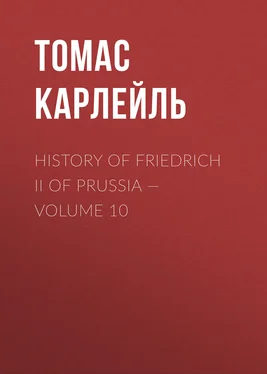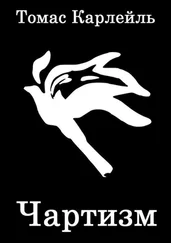Томас Карлейль - History of Friedrich II of Prussia — Volume 10
Здесь есть возможность читать онлайн «Томас Карлейль - History of Friedrich II of Prussia — Volume 10» — ознакомительный отрывок электронной книги совершенно бесплатно, а после прочтения отрывка купить полную версию. В некоторых случаях можно слушать аудио, скачать через торрент в формате fb2 и присутствует краткое содержание. Жанр: foreign_prose, История, literature_19, foreign_edu, foreign_antique, на английском языке. Описание произведения, (предисловие) а так же отзывы посетителей доступны на портале библиотеки ЛибКат.
- Название:History of Friedrich II of Prussia — Volume 10
- Автор:
- Жанр:
- Год:неизвестен
- ISBN:нет данных
- Рейтинг книги:4 / 5. Голосов: 1
-
Избранное:Добавить в избранное
- Отзывы:
-
Ваша оценка:
- 80
- 1
- 2
- 3
- 4
- 5
History of Friedrich II of Prussia — Volume 10: краткое содержание, описание и аннотация
Предлагаем к чтению аннотацию, описание, краткое содержание или предисловие (зависит от того, что написал сам автор книги «History of Friedrich II of Prussia — Volume 10»). Если вы не нашли необходимую информацию о книге — напишите в комментариях, мы постараемся отыскать её.
History of Friedrich II of Prussia — Volume 10 — читать онлайн ознакомительный отрывок
Ниже представлен текст книги, разбитый по страницам. Система сохранения места последней прочитанной страницы, позволяет с удобством читать онлайн бесплатно книгу «History of Friedrich II of Prussia — Volume 10», без необходимости каждый раз заново искать на чём Вы остановились. Поставьте закладку, и сможете в любой момент перейти на страницу, на которой закончили чтение.
Интервал:
Закладка:
"Smelfungus, denouncing the torpid fatuity of Voltaire's Biographers, says he never met with one Frenchman, even of the Literary classes, who could tell him whence this name VOLTAIRE originated. 'A PETITE TERRE, small family estate,' they said; and sent him hunting through Topographies, far and wide, to no purpose. Others answered, 'Volterra in Italy, some connection with Volterra,'—and seemed even to know that this was but fatuity. 'In ever-talking, ever-printing Paris, is it as in Timbuctoo, then, which neither prints nor has anything to print?' exclaims poor Smelfungus! He tells us at last, the name VOLTAIRE is a mere Anagram of AROUET L. J.—you try it; A.R.O.U.E.T.L.J.=V.O.L.T.A.I.R.E and perceive at once, with obligations to Smelfungus, that he has settled this small matter for you, and that you can be silent upon it forever thenceforth.
"The anagram VOLTAIRE, gloomily settled in the Bastille in this manner, can be reckoned a very famous wide-sounding outer result of the Rohan impertinence and blackguardism; but it is not worth naming beside the inner intrinsic result, of banishing Voltaire to England at this point of his course. England was full of Constitutionality and Freethinking; Tolands, Collinses, Wollastons, Bolingbrokes, still living; very free indeed. England, one is astonished to see, has its royal-republican ways of doing; something Roman in it, from Peerage down to Plebs; strange and curious to the eye of M. de Voltaire. Sciences flourishing; Newton still alive, white with fourscore years, the venerable hoary man; Locke's Gospel of Common Sense in full vogue, or even done into verse, by incomparable Mr. Pope, for the cultivated upper classes. In science, in religion, in politics, what a surprising 'liberty' allowed or taken! Never was a freer turn of thinking. And (what to M. de Voltaire is a pleasant feature) it is Freethinking with ruffles to its shirt and rings on its fingers;—never yet, the least, dreaming of the shirtless or SANSCULOTTIC state that lies ahead for it! That is the palmy condition of English Liberty, when M. de Voltaire arrives there.
"In a man just out of the Bastille on those terms, there is a mind driven by hard suffering into seriousness, and provoked by indignant comparisons and remembrances. As if you had elaborately ploughed and pulverized the mind of this Voltaire to receive with its utmost avidity, and strength of fertility, whatever seed England may have for it. That was a notable conjuncture of a man with circumstances. The question, Is this man to grow up a Court Poet; to do legitimate dramas, lampoons, witty verses, and wild spiritual and practical magnificences, the like never seen; Princes and Princesses recognizing him as plainly divine, and keeping him tied by enchantments to that poor trade as his task in life? is answered in the negative. No: and it is not quite to decorate and comfort your 'dry dung-heap' of a world, or the fortunate cocks that scratch on it, that the man Voltaire is here; but to shoot lightnings into it, and set it ablaze one day! That was an important alternative; truly of world-importance to the poor generations that now are; and it was settled, in good part, by this voyage to England, as one may surmise. Such is sometimes the use of a dissolute Rohan in this world; for the gods make implements of all manner of things.
"M. de Voltaire (for we now drop the Arouet altogether, and never hear of it more) came to England—when? Quitted England—when? Sorrow on all fatuous Biographers, who spend their time not in laying permanent foundation-stones, but in fencing with the wind!—I at last find indisputably, it was in 1726 that he came to England: [Got out of the Bastille, with orders to leave France, "29th April" of that year ( OEuvres de Voltaire, i. 40 n.).] and he himself tells us that he 1728.' Spent, therefore, some two years there in all,—last year of George I.'s reign, and first of George II.'s. But mere inanity and darkness visible reign, in all his Biographies, over this period of his life, which was above all others worth investigating: seek not to know it; no man has inquired into it, probably no competent man now ever will. By hints in certain Letters of the period, we learn that he lodged, or at one time lodged, in 'Maiden Lane, Covent Garden;' one of those old Houses that yet stand in Maiden Lane: for which small fact let us be thankful. His own Letters of the period are dated now and then from 'Wandsworth.' Allusions there are to Bolingbroke; but the Wandsworth is not Bolingbroke's mansion, which stood in Battersea; the Wandsworth was one Edward Fawkener's; a man somewhat admirable to young Voltaire, but extinct now, or nearly so, in human memory. He had been a Turkey Merchant, it would seem, and nevertheless was admitted to speak his word in intellectual, even in political circles; which was wonderful to young Voltaire. This Fawkener, I think, became Sir Edward Fawkener, and some kind of 'Secretary to the Duke of Cumberland:'—I judge it to be the same Fawkener; a man highly unmemorable now, were it not for the young Frenchman he was hospitable to. Fawkener's and Bolingbroke's are perhaps the only names that turn up in Voltaire's LETTERS of this English Period: over which generally there reigns, in the French Biographies, inane darkness, with an intimation, half involuntary, that it SHOULD have been made luminous, and would if perfectly easy.
"We know, from other sources, that he had acquaintance with many men in England, with all manner of important men: Notes to Pope in Voltaire-English, visit of Voltaire to Congreve, Notes even to such as Lady Sundon in the interior of the Palace, are known of. The brightest young fellow in the world did not want for introductions to the highest quarters, in that time of political alliance, and extensive private acquaintance, between his Country and ours. And all this he was the man to improve, both in the trivial and the deep sense. His bow to the divine Princess Caroline and suite, could it fail in graceful reverence or what else was needed? Dexterous right words in the right places, winged with ESPRIT so called: that was the man's supreme talent, in which he had no match, to the last. A most brilliant, swift, far-glancing young man, disposed to make himself generally agreeable. For the rest, his wonder, we can see, was kept awake; wonder readily inclining, in his circumstances, towards admiration. The stereotype figure of the Englishman, always the same, which turns up in Voltaire's WORKS, is worth noting in this respect. A rugged surly kind of fellow, much-enduring, not intrinsically bad; splenetic without complaint, standing oddly inexpugnable in that natural stoicism of his; taciturn, yet with strange flashes of speech in him now and then, something which goes beyond laughter and articulate logic, and is the taciturn elixir of these two, what they call 'humor' in their dialect: this is pretty much the REVERSE of Voltaire's own self, and therefore all the welcomer to him; delineated always with a kind of mockery, but with evident love. What excellences are in England, thought Voltaire; no Bastille in it, for one thing! Newton's Philosophy annihilated the vortexes of Descartes for him; Locke's Toleration is very grand (especially if all is uncertain, and YOU are in the minority); then Collins, Wollaston and Company,—no vile Jesuits here, strong in their mendacious mal-odorous stupidity, despicablest yet most dangerous of creatures, to check freedom of thought! Illustrious Mr. Pope, of the Essay on Man, surely he is admirable; as are Pericles Bolingbroke, and many others. Even Bolingbroke's high-lacquered brass is gold to this young French friend of his.—Through all which admirations and exaggerations the progress of the young man, toward certain very serious attainments and achievements, is conceivable enough.
"One other man, who ought to be mentioned in the Biographies, I find Voltaire to have made acquaintance with, in England: a German M. Fabrice, one of several Brothers called Fabrice or Fabricius,—concerning whom, how he had been at Bender, and how Voltaire picked CHARLES DOUSE from the memory of him, there was already mention. The same Fabrice who held poor George I. in his arms while they drove, galloping, to Osnabriick, that night, IN EXTREMIS:—not needing mention again. The following is more to the point.
Читать дальшеИнтервал:
Закладка:
Похожие книги на «History of Friedrich II of Prussia — Volume 10»
Представляем Вашему вниманию похожие книги на «History of Friedrich II of Prussia — Volume 10» списком для выбора. Мы отобрали схожую по названию и смыслу литературу в надежде предоставить читателям больше вариантов отыскать новые, интересные, ещё непрочитанные произведения.
Обсуждение, отзывы о книге «History of Friedrich II of Prussia — Volume 10» и просто собственные мнения читателей. Оставьте ваши комментарии, напишите, что Вы думаете о произведении, его смысле или главных героях. Укажите что конкретно понравилось, а что нет, и почему Вы так считаете.









